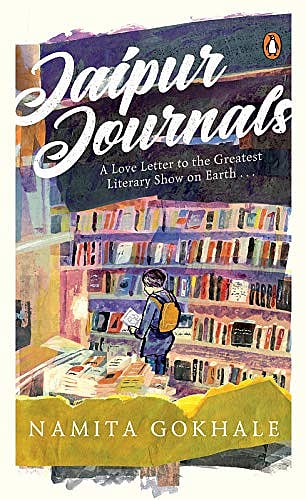Festival Insider

Jaipur Journals is not written by just any old writer with an axe to grind or a yen to be invited to the festival to discuss it. The author is Namita Gokhale, festival co-director, who is integral to all five days of it. If you’re a festival regular, then it’s likely you’ve seen Gokhale herself, walking purposefully from one venue to the next, or talking to one of the million people who seek out her attention. It’s therefore surprising that Jaipur Journals isn’t a memoir, but a novel about people on the outskirts, looking in. It’s the sort of novel you’d expect someone lingering at the edges of the crowd to write, there’s a certain wistfulness to each character, even the few characters who are established writers seem lonely and awkward, unsure of their place in the world. And the star of the whole thing, the perfect character in this bouquet of characters is Rudrani Rana, an old woman who traipses through the festival, an unsubmitted manuscript in her purse, and sends poison pen notes to people whose opinion she disagrees with.
She is an old, strange woman, and like a lot of older women, she feels effectively invisible, which is why it’s so easy for her to slip in and out of places undetected. Other characters keep bumping into her, but no one really sees her except for one man, who is drawing faces in the crowd—based, I assume, on Nishant Jain aka Sneaky Artist, who attended the 2019 edition and posted pictures of panels and people he drew. In fact, characters based on real life—or literally real people—crop up throughout, which leads to an interesting ‘was this 2017 she’s referring to here or 2016?’
It's the Pits!
13 Feb 2026 - Vol 04 | Issue 58
The state of Indian cities
It’s as if Gokhale thought to herself, ‘What if JLF Insider [the popular anonymous Twitter account specialising in panel takedowns] is but an elderly woman wandering about the festival with her bag and her books?’ It works well—while you might not be inclined to cheer for a JLF Insider-type person or persons—Rudrani Rana, despite her addiction to nasty anonymous notes, is a character the reader begins to sympathise with—and love—almost immediately.
She thinks of her unsubmitted manuscript, just languishing in her bag: ‘Another even more terrifying thought struck her. What if the book succeeded? What if it were to get published, what if she was to become a real writer? The idea frightened her. It was surely better to have never tried at all than to be a miserable failure. But to be tested every day by the demands and expectations of prying readers—that was possibly the worst scenario of all.’ This passage stood out with such force, because it’s a very real dilemma for the unpublished writer: what if you try and you fail? What if you try and you succeed and you never have time for yourself? It hasn’t been acknowledged before, usually characters who are aspiring authors are just waiting to send off their book to the publisher or are waiting for their one big break, Rudrani Rana’s hesitation here spoke to me so clearly, the juxtaposition of what-ifs. It’s also a good example of how, as you read, you see that far from being just an old woman who is somewhat eccentric, a granny-figure, a mistake many authors make with their older characters, this is a complicated person, with layers and feelings.
Rudrani isn’t the only character in Jaipur Journals who stands out—she’s just my personal favourite—there’s the burglar turned Urdu poet, thanks to demonetisation, no, really. There’s a ‘radical gender-fluid diaspora novelist’ and the academic with two last names. It’s all very funny, and very real, but the humour comes from meticulous observation, not by exaggeration. In fact, it is a bit reminiscent of books like A Man Called Ove, a journey where everyone’s stories resolve nicely in the end. All set over the course of a five day festival. The gauntlet for JLF novels has been thrown down, but Jaipur Journals has set the tone—and the standard.

